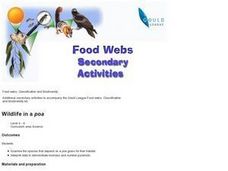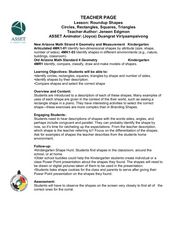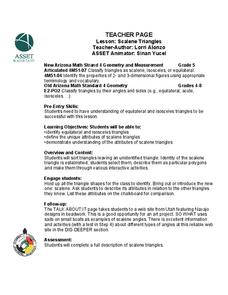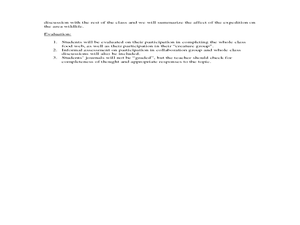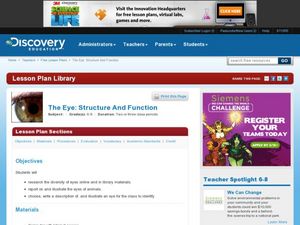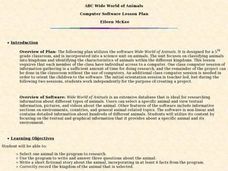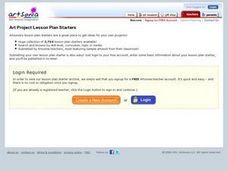Curated OER
Using the senses
Students use their senses to compare a frog and a hamster. In this animals comparison lesson plan, students get into groups and observe, smell, feel, and listen to what their animals are like, and classify them into categories.
Curated OER
Classifying Critters
In this classifying critters activity, students read a 1 page article on classifying living organisms and then answer 10 true or false, short answer, multiple choice or fill in the blank questions.
Curated OER
Shell Sort; Serving up Seafood
Students complete various small group activities to classify items and determine the types of combinations that can be made with these items. In the second lesson, students create menus for a restaurant to help them gain money sense and...
Curated OER
Wildlife in a Poa
Students examine the species that depend on a poa grass for their habitat and interpret data to demonstrate biomass and number pyramids. They examine the plant by digging it up and pulling it apart quickly to capture all the...
Curated OER
Sorting
Young scholars identify how objects can be sorted or classified for easy access. In this sorting activity, students will investigate how letters, numbers, and symbols are used in sorting and classifying.
Curated OER
Circles, Rectangles, Squares, Triangles
Students identify, compare and classify the various shapes. In this shapes activity, students listen to descriptions of shapes with words such as sides, angles, congruent, and parallel. Students then give the teacher examples of shapes...
Curated OER
Scalene Triangles
Fifth graders identify and classify scalene, equilateral, and isosceles triangles. In this triangle lesson, 5th graders define the different attributes of 3 types of triangles and sort them by descriptions and comparisons. Students...
Curated OER
Animals and the Food Webs that Love Them
Students study the animals that Lewis and Clark would have encountered. In this animals lesson students study the food web and how human populations have affected them.
Curated OER
Aim-- Use a Carroll Diagram to Sort Animals
In this science worksheet, students cut out pictures of 12 animals and paste them into the correct space on the Carroll diagram. Students classify animals as living in water or land and with or without legs.
Curated OER
Dolphins or Sharks?
In this dolphins and sharks comparison worksheet, students complete a web on each animal and choose from a list the attributes that fit each one. Students create a poster promoting conservation of our ocean friends.
Curated OER
Taking Apart Owl Pellets
Students dissect an owl pellet. For this rodent and bone structure lesson, students work in groups to take apart an owl pellet. Students separate all the tiny bones from the fur and use the bones to reconstruct the rodent on a tag board....
Curated OER
The Eye; Structure and Function
Students research the structure and function of the eye. In this anatomy lesson, students write a report about the eye and draw an illustration. They research a particular animal's eye then present their findings to the class without...
Curated OER
Gorilla Word Search
In this gorilla vocabulary words instructional activity, students search for words that describe the gorilla's classification, environment, types, and other facts. Students word search sixteen gorilla vocabulary words.
Curated OER
Touching Traits
Students describe objects using only their sense of touch. In this instructional activity on describing characteristics, students use only their sense of touch to describe an unseen object in a box. This instructional activity can be...
Curated OER
ABC Wide World of Animals
Fifth graders use the software Wide World of Animals. This lesson is incorporated into a science unit on animals. The unit focuses on classifying animals into kingdoms and identifying the characteristics of animals within the different...
Curated OER
Who's Who? Integrated Core
Student discuss names and nicknames for human and animal families and complete a worksheet, matching pictures of father, baby and mother animals.
Curated OER
Classification of Animals
First graders investigate the characteristics of vertebrates. They classify each as mammal, fish, bird, and reptiles. Students explore the differences between various types of animals and classify each.
Curated OER
Animals and Habitats of the Chesapeake Bay
Students work in small groups to discover the various habitats present in Chesapeake Bay and the animals that live in them. After investigating the habits and lives of the animals they will draw conclusions about other habitats the...
Curated OER
Taxonomy Project
Students act as a taxonomist and, given a certain situation, classify existing organisms.
Biology Junction
Mollusks
Mollusks created every shell on Earth. Young scientists learn more about the phyllum mollusca in an informative presentation. It covers their characteristics, body plans, and relationships in the ecosystem. Then, it details each class of...
Curated OER
The Living Environment
Ninth graders compare and contrast animals according to their four systems. In this living environment lesson students complete their assignment on the animal they were given and present their findings to the class.
Curated OER
Animals Spiral Puzzle
In this animal puzzle instructional activity, students use a set of 8 clues about animals to complete a spiral puzzle. A reference web site is included for additional activities.
Curated OER
It's A Jungle Out There!
Students report on an animal according to its appearance, habitat, and characteristics.
Curated OER
Kingdom Animalia
Young scholars are introduced to the basic characteristics of the animal kingdom. this instructional activity is part of a multi-segmented unit on the diversity of life. In this segment, students explore the the members of a few phyla of...





